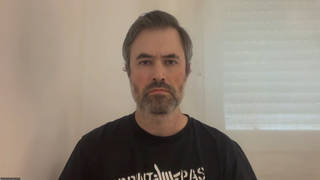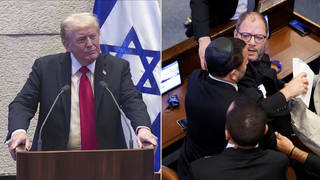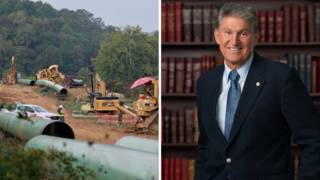
As Senator Joe Manchin demands Democrats drop critical climate funding to replace coal- and gas-fired power plants with renewable energy sources, investigative reporting into the financial dealings of Manchin reveals that he has profited over $4.5 million from investments in West Virginia coal companies since he became a U.S. senator. Investigative journalist Daniel Boguslaw, who looked into the network of coal companies that Manchin and his family has owned and held stock in over the decades, says Manchin’s voting record in Washington shows him “prioritizing a dying industry that he’s making millions of dollars off of.” The report also finds that Manchin’s family coal businesses have grim records of pollution, safety violations and death.
Transcript
AMY GOODMAN: This is Democracy Now! I’m Amy Goodman, with Nermeen Shaikh, as we turn now to look at “Joe Manchin’s Dirty Empire.” That’s the headline of a recent investigation by The Intercept into Manchin’s business holdings in West Virginia. Reporter Daniel Boguslaw examines how Manchin has profited from a series of coal companies that he founded during the ’80s. His son, Joe Manchin IV, now runs the companies, but Senator Manchin continues to earn millions from the firms. Manchin is now demanding Democrats strip funding for the Clean Electricity Performance Program, a critical climate initiative to replace coal- and gas-fired plants with renewable energy sources. Investigative journalist Daniel Boguslaw filed this story with support from Type Investigations and joins us now from Portland, Oregon.
Lay out for us, Daniel Boguslaw — on the one hand, you have Senator Manchin, the largest recipient of oil, gas, coal money in the Senate, but what isn’t talked as much about is that he is making millions off his own companies in West Virginia, even if some of that money is now in a blind trust. Lay out the empire.
DANIEL BOGUSLAW: Sure. First of all, thanks for having me.
In the late '80s, Manchin basically started a coal brokerage firm. He was the middleman between suppliers and buyers. And from that time, he built out the empire, essentially, brokering coal between all these plants. Today that's largely focused on the Grant Town Power Plant, which at one point he became the main supplier of. The biggest issue to understand here is the way that that impacts the air, the soil and the water of West Virginia, the way that the coal that he’s supplying ends up impacting the environment across all these dimensions and impacting constituents in a number of ways.
NERMEEN SHAIKH: Daniel, you also — you talk in the piece about how, during the Obama administration, Manchin was one of the loudest voices opposing the Obama era’s EPA rules limiting mercury and aerosolized acid emissions, but then, subsequently, he reversed his position under the Trump administration. Could you explain what happened?
DANIEL BOGUSLAW: Sure. So, effectively, these rules were seeking to limit and impose regulations on the way coal-fired power plants could release mercury and also sulfur dioxide acid gas. This would have created a requirement for these plants to use expensive scrubbing technology, and so the industry was opposed to anything that could potentially cut into their profits. Once those technologies were already installed, these suppliers were able to increase their rates, which were passed on to consumers. And so, during the Trump years, when parts of the industry were looking at overturning by these regulations, these companies had already incorporated the costs into their rates. And so, removing them could have also forced them to lower the rates they were able to charge, having already suffered a loss from installing this technology. And so Manchin went from decrying regulation of these extremely dangerous production facilities to turning around and saying that mercury is extremely dangerous for children, and effectively doing a complete 180.
AMY GOODMAN: And in this final question, can you talk about the extent to which he and his family, his brothers, his son, have profited so enormously to this day to continuation of the coal industry, even though he recognizes it’s a dying industry?
DANIEL BOGUSLAW: Sure. Well, I mean, I think what you’re seeing is prioritizing a dying industry that he’s making millions of dollars off of, while on the table in Biden’s package we’re seeing all of these incentives to completely modernize that industry, to invest in clean energy technologies. Unfortunately, that’s not Manchin’s business. His business is coal. And I think we’re going to continue to see that be prioritized as these negotiations continue.
AMY GOODMAN: Well, Daniel Boguslaw, we’re going to continue to look at this issue, investigative reporter, new Intercept story, we’ll link to, “Joe Manchin’s Dirty Empire.”
Next up, we go to Egypt to look at the case of the imprisoned activist and blogger Alaa Abd El-Fattah, who’s spent much of the past decade locked up. Stay with us.












Media Options